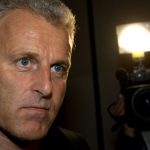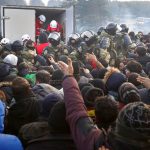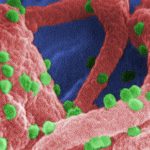In stripping Russia of the Champions League Final, European football’s governing body has acted with the kind of speed, clarity and decisiveness not often associated with sporting authorities.
UEFA’s move to switch football’s greatest club showpiece on 28 May from St Petersburg to Paris came little more than 24 hours after Vladimir Putin’s missiles began landing in Ukraine.
In doing so, despite the risk to its lucrative sponsorship deal with the Russian state energy company Gazprom, it has arguably shown the way for other sporting organisations pondering their response to the invasion.
Please use Chrome browser for a more accessible video player
Gazprom has been a UEFA sponsor for a decade, and spends about £33m a year backing the Champions League, European Championships and Nations League.
Its chief executive Alexander Dyukov, who is also president of the Russian Football Union, was a minority voice on the UEFA executive committee which voted to scrap only the second Russian staging of a Champions League final.
UEFA also ordered Russian and Ukrainian clubs and national teams to play their home matches at neutral venues until further notice.
Michael Masi replaced as F1 race director after controversial 2021 Abu Dhabi finale
Abu Dhabi Grand Prix: Controversy around Max Verstappen’s win over Lewis Hamilton ‘tarnishing the image of F1’, says sport’s governing body
Formula 1: Max Verstappen clinches pole position in Abu Dhabi F1 qualifier – pushing Lewis Hamilton down to second
Key developments:
• Russian invasion reaches Kyiv
• President tells his troops ‘you are all we have’ as he accuses Europe of not doing enough
• UK flights banned from Russia in retaliation after British sanctions slapped on Aeroflot
Formula One’s rulers – acting somewhat against type – have been equally swift in announcing September’s Grand Prix will not go ahead in Sochi.
They have brazened out years of flak over racing in venues such as Bahrain and Saudi Arabia.
But, evidently, they have recognised this is different.
They had come under instant pressure from their own drivers.
Four-time world champion Sebastian Vettel said if the race went ahead, he would not be there. The German, influential as head of the Grand Prix Drivers’ Association, was “shocked” by what he had seen from Ukraine, adding, “It’s wrong to race there. I will not go.”
Additionally, Australia’s Prime Minister Scott Morrison had urged his country’s top driver Daniel Ricciardo to stay away.
Morrison has also ordered Australian skiers to boycott a World Cup event in Yaroslav this weekend.
This will become a theme. Sportspeople keen to keep competing in Russia, or unsure how to respond, will be told by governments to stay away.
Please use Chrome browser for a more accessible video player
For now it will be for individuals and for sports organisations to make the tough calls.
Can world swimming body FINA keep its World Short-Course Championship in Kazan? Will the Winter Paralympics allow Russian competitors on the start lines in Beijing from next Friday?
The German club Schalke blazed a trail yesterday by removing Gazprom from its shirts, the second tier club risking vital income but keeping its morals intact.
Subscribe to the Daily podcast on Apple Podcasts, Google Podcasts, Spotify, Spreaker
In a less commercially significant move, but nonetheless sending the right message, Manchester United have followed suit by dropping the Russian airline Aeroflot as a sponsor.
The Football Association has made it clear players, clubs and fans can protest against the invasion without fear of punishment.
Russia’s invasion of Ukraine has well and truly begun – here are four ways it could end
Normal regulations forbid displays that could be seen as political.
But as the FA has recognised, these are not normal times.






















